By Aakash Chugh, MBA2020
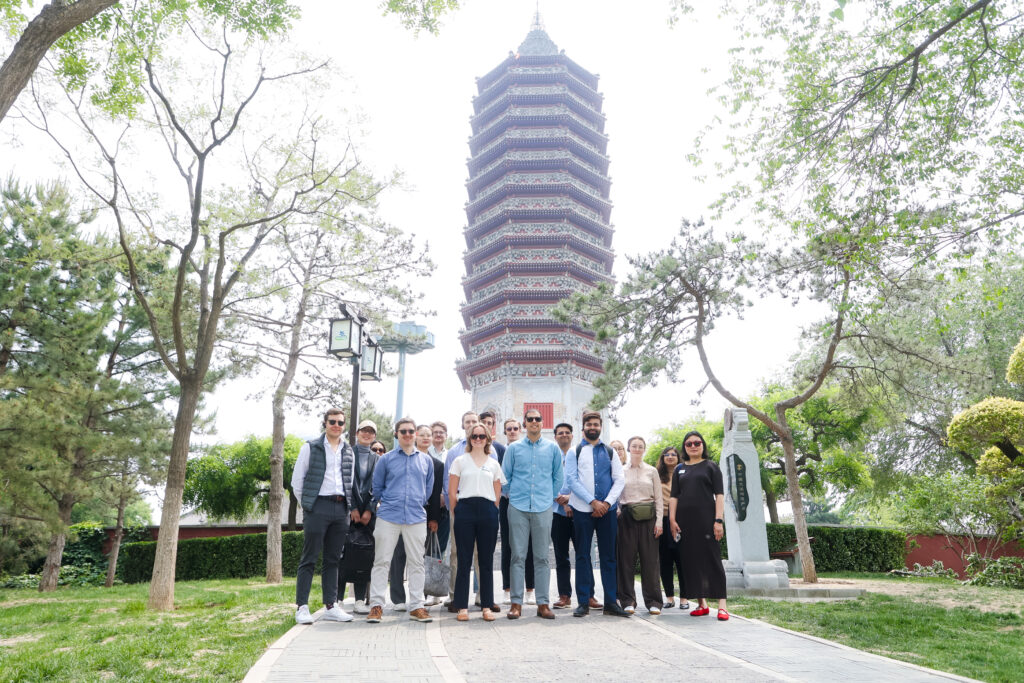
Returning to an academic setting after years in the professional world creates a unique perspective – one that combines theoretical frameworks with practical experience. This blend of viewpoints defined my recent journey with London Business School as an alumnus participating in their first ever Global Experience in Beijing, China. Like many in my cohort, my final-year global experience was cancelled in 2020 due to the pandemic. When the school thoughtfully offered alumni the opportunity to participate, it felt like a chance to complete an important chapter in my educational journey.
The MBA Lens Meets Industry Experience
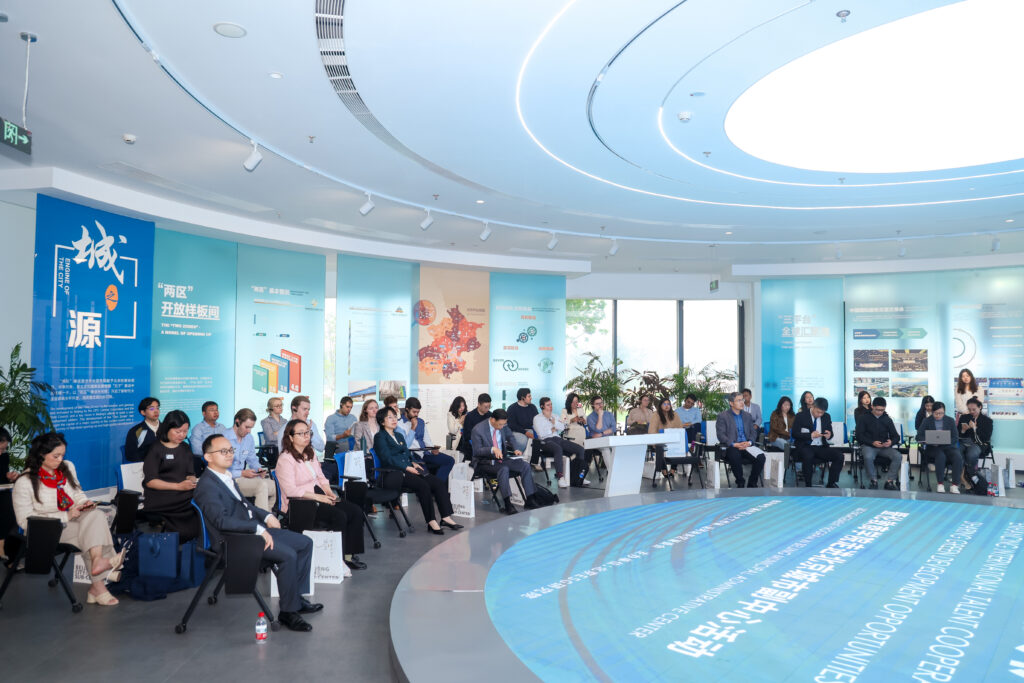
The moment I stepped into our first organisational visit, I was transported back to the classroom environment, where analysis of business models, revenue streams, and profit mechanisms dominated our discussions. Fellow alumni and current students alike leaned forward, dissecting operational strategies with the precision that LBS instils in its graduates.
Yet something had changed in me. Five years in industry had layered a new dimension onto that analytical foundation – one the MBA alone couldn’t provide. Beyond the frameworks and financial metrics now lived an appreciation for the human networks that sustain business, the real-world friction that challenges even the most elegant theories, and the tangible impact our work has on end consumers.
It wasn’t that the MBA education was lacking; rather, it was designed as the foundation upon which experience would build. The classroom equips you with the analytical toolkit, but industry teaches you when and how to apply each tool – and sometimes, when to set them aside in favour of intuition built through experience.
The quality of debate among current students was striking – confident, data-driven, and respectful – a vivid reminder of the intellectual rigour that continues to define the LBS experience. Their energy and insight made me appreciate how my own journey had expanded beyond theory into lived experience.
China: Beyond the Western Narrative
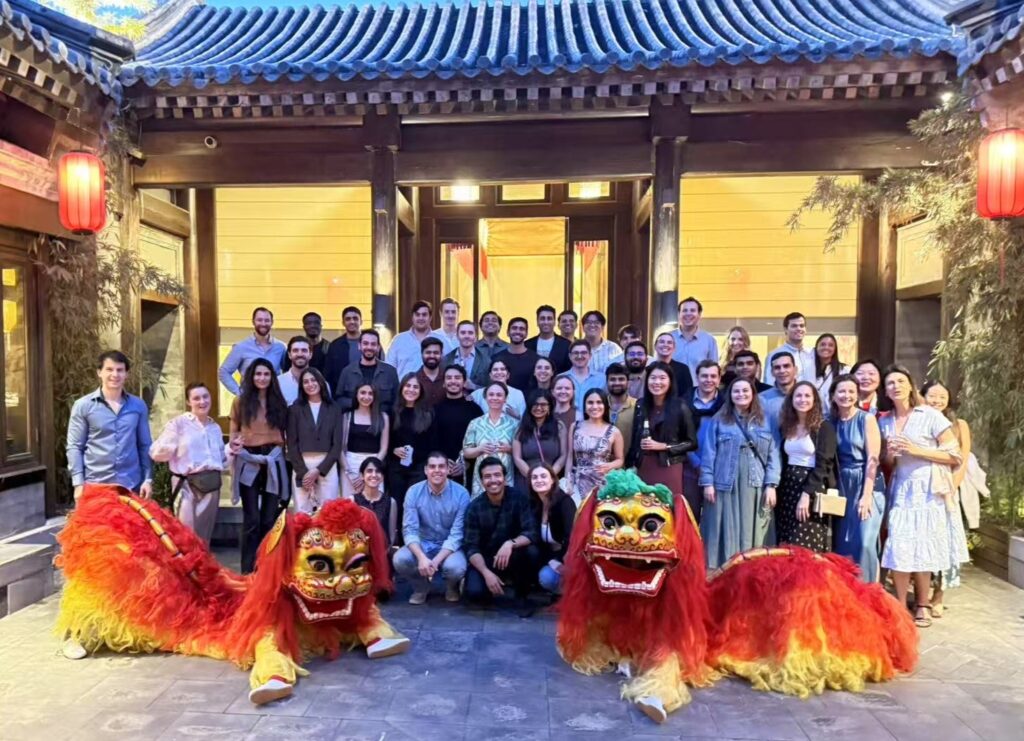
One of the most striking elements of this journey was experiencing China firsthand, beyond the filtered lens of Western media. Beijing revealed itself as a beautiful contradiction – modern financial districts existing in harmony with historical centres that breathe cultural significance. Shanghai, which I explored independently after the programme, showcased strong Western influences while maintaining an unmistakably Chinese identity in its DNA.
Before the official Global Experience began, I ventured out to explore Beijing on my own, booking tours to the Great Wall of China, a sidecar exploration of Beijing, and a street food tour. These excursions offered unexpected insights through conversations with my tour guides. Each guide shared how the pandemic had forced them to pivot careers – becoming tour guides after their previous livelihoods were disrupted. Their stories revealed a common thread of resilience as they found new joy in showcasing their country and cuisine to visitors. These personal narratives of adaptation mirrored the larger themes of resilience we would later encounter in our business visits.
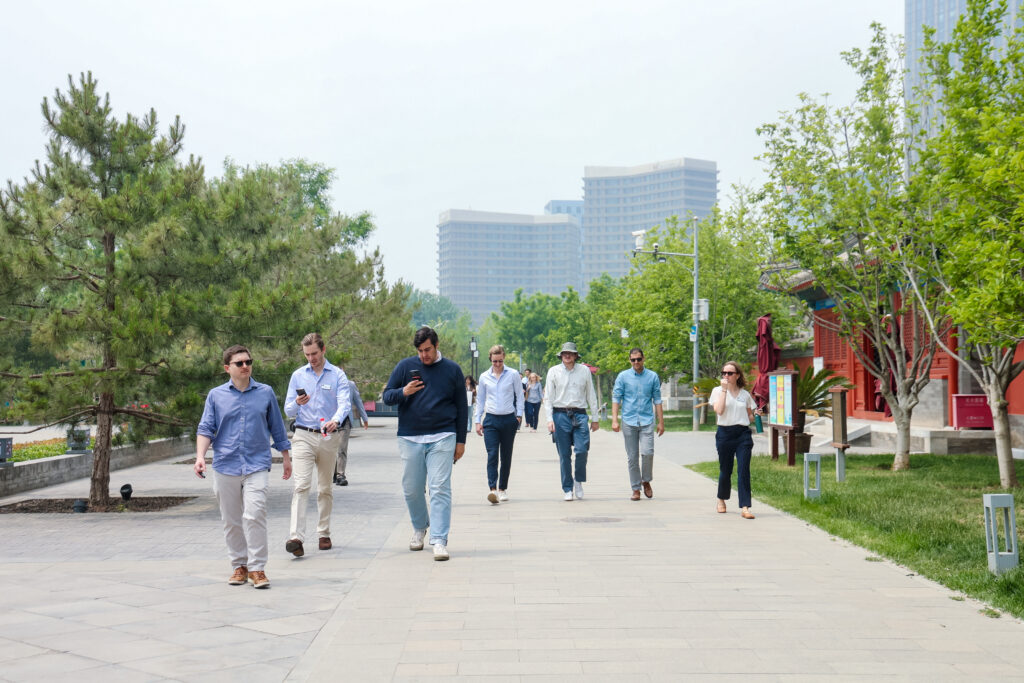
I found myself reflecting on the privilege that enabled this perspective – the opportunity to witness personally how Chinese businesses approach global challenges rather than relying solely on external narratives. It’s one thing to read about China’s sustainability initiatives; it’s quite another to visit Yuanchu HQ and hear from the founder himself on how they transform captured carbon into calcium carbonate, literally turning an environmental liability into an industrial asset.
What proved most impressive was witnessing the scale and pace of China’s renewable energy transformation. No other country has matched its base – nearly 64% of global renewable additions in 2024 came from China alone. This massive deployment has driven down solar and wind costs by over 80% in a decade, creating a template that other economies can now leverage for their own green transitions.
China’s strategic policy framework, embedded in its 14th Five-Year Plan with accelerated targets through state-backed investment, grid modernisation, and industrial coordination, has proved that the green transition is achievable at scale. The results speak for themselves: clean energy now contributes nearly 10% of China’s GDP, demonstrating that state leadership and a top-down approach can be tremendously effective in deploying large-scale green energy projects.
Innovation in Practice: From Theory to Implementation
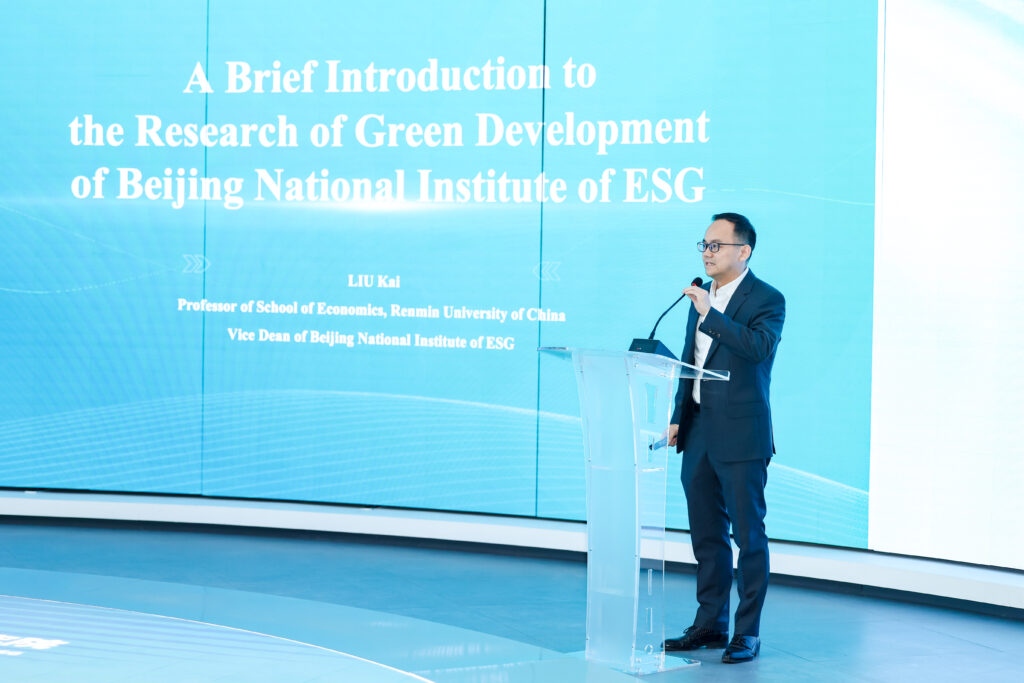
The organisations we visited demonstrated fascinating approaches to business resilience in an era defined by climate change. The interplay between public and private sectors was particularly interesting to hear about and understand – each entity finding its role in addressing sustainability challenges.
Take Glodon, the digital construction company working in tandem with government entities to implement ESG initiatives. Their approach doesn’t just tick regulatory boxes; it delivers tangible cost savings by integrating climate considerations into the design process. This isn’t sustainability as an afterthought or marketing exercise – it’s sustainability woven into the business model itself, creating value rather than merely avoiding harm.
Yuanchu presented perhaps one of the most innovative approaches – moving beyond typical carbon capture to focus on mineralisation efforts that convert captured carbon into calcium carbonate. This creates potential revenue streams for industries working towards decarbonisation – transforming a sustainability requirement into a business opportunity. Their model doesn’t depend on carbon credits or government subsidies; it’s profitable in its own right, producing marketable materials that happen to be carbon-negative.
Even NIO, the electric vehicle company, demonstrated an integrated approach to renewable energy challenges. Their charging stations don’t just charge and replace batteries – they store excess energy from solar panels, providing surplus during peak demand and addressing one of the key challenges of grid integration for renewables.
These businesses aren’t just adapting to climate realities – they’re discovering new forms of value within the constraints those realities impose. It’s a powerful reminder that resilience isn’t merely about survival; it’s about finding opportunity within changing parameters.
Challenges and Complexities

Of course, China’s energy transition isn’t without its complexities. Ongoing coal use and grid integration issues remain significant challenges. These realities highlight the difficulties of a rapid energy transition in any context, but especially in a country of China’s scale and industrial base.
Yet these challenges themselves offer valuable lessons. The way Chinese technology in the green energy sector combines with government determination for decarbonisation and strong cooperation from the finance sector creates a powerful ecosystem for achieving ambitious goals.
To outright reject China’s model would be to deny the world’s most effective real-time case study in clean energy transformation. Many developing countries simply cannot afford to start from scratch, making certain elements of China’s approach – adapted for local contexts – potentially valuable across the Global South.
One personal takeaway that crystallised during this experience was the critical importance of environmental justice. As we transition to a green economy globally, we must ensure this shift doesn’t come at the expense of local environments and communities. The question that now occupies my thinking is: how do we ensure this transition is equitable? How do we prevent the burdens of change from falling disproportionately on vulnerable populations while the benefits accrue elsewhere?
The Human Dimension: Connections Across Experience Levels
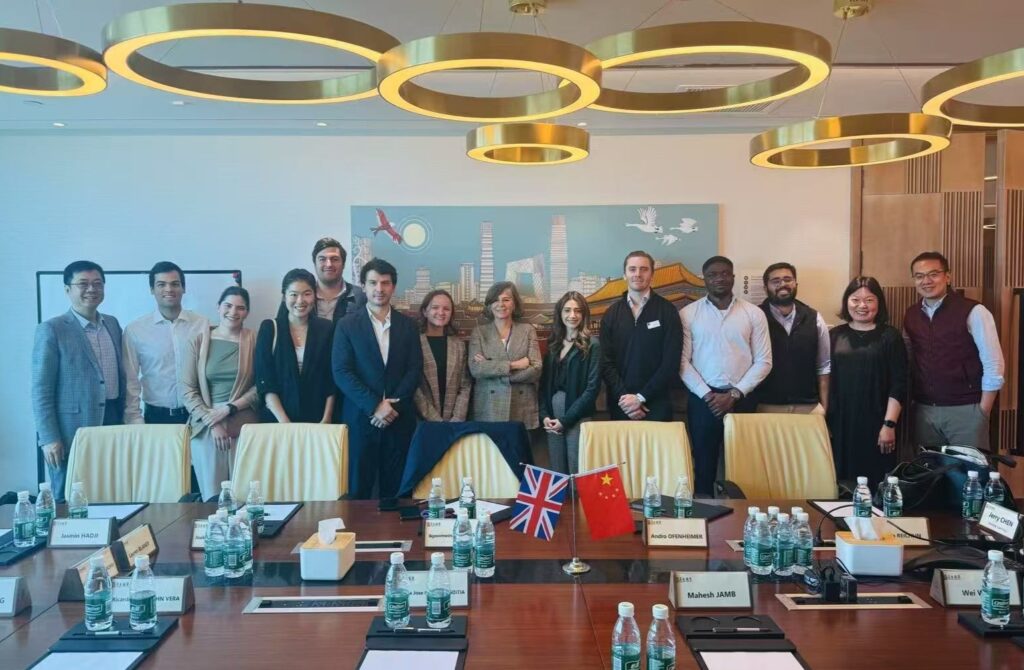
Some of the most meaningful moments came through interactions with current students still navigating the intense MBA experience. Witnessing their journey through full-time recruitment and the realities of challenging job markets reminded me of my own path. Their questions about life post-MBA created spaces for reflection on how much the programme had shaped my professional resilience.
What struck me was how their experiences, though focused on sustainability, echoed broader MBA lessons about perseverance. The businesses we visited faced significant headwinds – geopolitical tensions and differing global standards requiring international cooperation, to name a few – yet continued moving forward to build a green economy and contribute to development goals.
This parallel between student journeys and business challenges reinforced perhaps the most important lesson from my MBA: resilience in the face of uncertainty. Good things happen when we continue to persevere, whether in career development or sustainable business innovation.
Closing the Circle
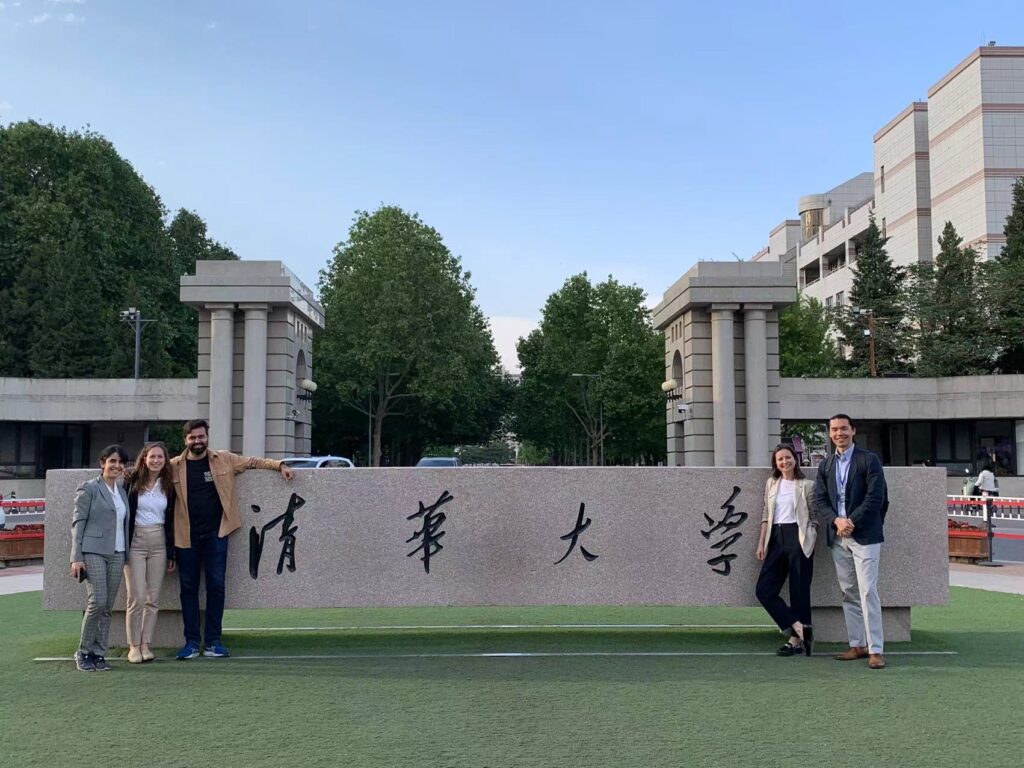
“How does it feel to be back as an alumnus?” a current student asked me during our trip. My answer surprised even me: “I think I have closure now on my MBA journey. I didn’t know how much I needed it until I experienced it.”
This experience will definitely influence my approach to sustainability, innovation, and cross-cultural business moving forward. It has shown me that effective change requires perseverance and difficult conversations with business leaders – but with backing from senior stakeholders, significant progress is possible.
For those affected by pandemic-related cancellations of global experiences, I strongly encourage taking advantage of alumni opportunities like this one. There’s something powerful about completing what was left unfinished, about seeing how the analytical frameworks from your MBA interact with five years of practical experience.
What began as a trip to explore business resilience in the climate era became, for me, a testament to personal resilience – the MBA journey coming full circle, reminding me that we land on our feet when we persevere through challenges, whether in business or in life.
And isn’t that what the MBA ultimately taught us? To analyse, adapt, and move forward – skills that serve us well beyond the classroom, whether navigating global markets or pandemic disruptions. Five years later, that lesson remains perhaps the most valuable of all.
I am deeply grateful to Wei, Rachel, Margaux, Fiona, Professor Alex, Professor Lucrezia, and the entire ground staff in Beijing for making this experience seamless and truly memorable – your dedication brought this journey to life.
